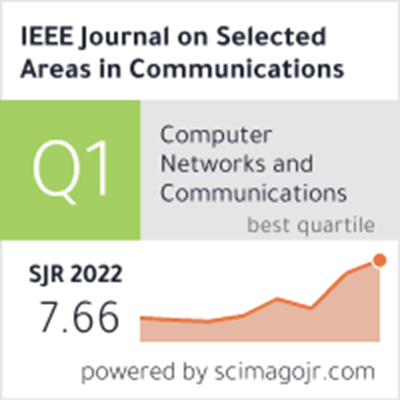互联运营商CDN的分布式缓存算法
IF 17.2
1区 计算机科学
Q1 ENGINEERING, ELECTRICAL & ELECTRONIC
IEEE Journal on Selected Areas in Communications
Pub Date : 2017-02-01
DOI:10.1109/JSAC.2017.2659118
引用次数: 9
摘要
固定和移动网络运营商越来越多地部署托管内容分发网络(CDN),目的是减少其传输链路上的流量,并提高客户的体验质量。随着网络运营商管理的CDN(nCDN)变得普遍,运营商可能会提供通用接口来互连其nCDN,以实现互利,就像他们今天在对等网络中所做的那样。在本文中,我们考虑使用分布式算法来计算nCDN的缓存分配的问题。我们表明,如果每个网络运营商都以最小化成本为目标,并且不允许双边支付,那么可能无法计算缓存分配。对于可以进行双边支付的情况,我们提出了两种分布式算法,即总价值补偿算法和目标价值补偿算法,它们在允许的并行度和nCDN之间交换的信息量方面有所不同。我们证明了算法的收敛性,并提出了一种保证事后个体合理性的方案。在实际自治系统级网络拓扑和合成拓扑上进行的仿真表明,该算法具有几何收敛率,并且与图的密度和nCDN容量具有良好的比例关系。本文章由计算机程序翻译,如有差异,请以英文原文为准。
Distributed Caching Algorithms for Interconnected Operator CDNs
Fixed and mobile network operators increasingly deploy managed content distribution networks (CDNs) with the objective of reducing the traffic on their transit links and to improve their customers’ quality of experience. As network operator managed CDNs (nCDNs) become commonplace, operators will likely provide common interfaces to interconnect their nCDNs for mutual benefit, as they do with peering today. In this paper, we consider the problem of using distributed algorithms for computing a cache allocation for nCDNs. We show that if every network operator aims to minimize its cost and bilateral payments are not allowed, then it may be impossible to compute a cache allocation. For the case when bilateral payments are possible, we propose two distributed algorithms, the aggregate value compensation and the object value compensation algorithms, which differ in terms of the level of parallelism they allow and in terms of the amount of information exchanged between nCDNs. We prove that the algorithms converge, and we propose a scheme to ensure ex-post individual rationality. Simulations performed on a real autonomous system-level network topology and synthetic topologies show that the algorithms have geometric rate of convergence, and scale well with the graphs’ density and the nCDN capacity.
求助全文
通过发布文献求助,成功后即可免费获取论文全文。
去求助
来源期刊
CiteScore
30.00
自引率
4.30%
发文量
234
审稿时长
6 months
期刊介绍:
The IEEE Journal on Selected Areas in Communications (JSAC) is a prestigious journal that covers various topics related to Computer Networks and Communications (Q1) as well as Electrical and Electronic Engineering (Q1). Each issue of JSAC is dedicated to a specific technical topic, providing readers with an up-to-date collection of papers in that area. The journal is highly regarded within the research community and serves as a valuable reference.
The topics covered by JSAC issues span the entire field of communications and networking, with recent issue themes including Network Coding for Wireless Communication Networks, Wireless and Pervasive Communications for Healthcare, Network Infrastructure Configuration, Broadband Access Networks: Architectures and Protocols, Body Area Networking: Technology and Applications, Underwater Wireless Communication Networks, Game Theory in Communication Systems, and Exploiting Limited Feedback in Tomorrow’s Communication Networks.

 求助内容:
求助内容: 应助结果提醒方式:
应助结果提醒方式:


